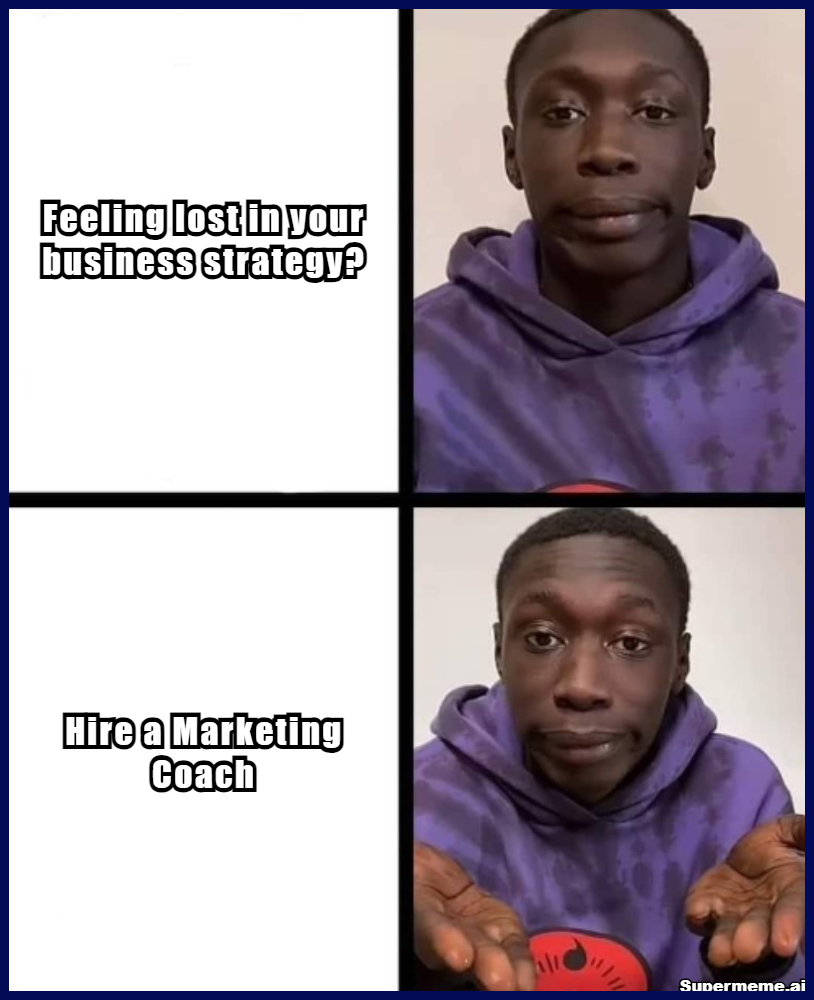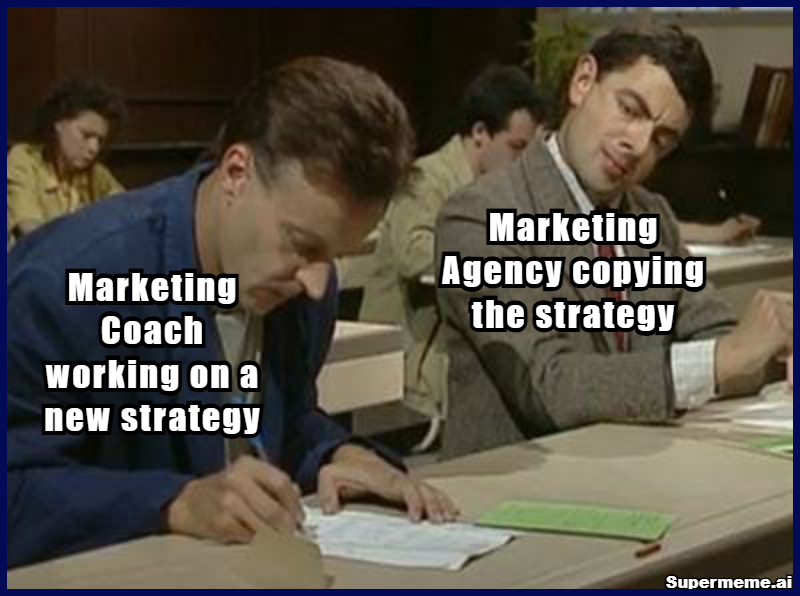In the world of small businesses, reaching success takes a well-rounded approach, and marketing plays a key role. Many small business owners have the passion and motivation needed to succeed. However, they may not have the marketing knowledge or experience to make the most of their efforts.
Key Highlights
- If you run a small business, marketing is very important for your success, but handling it by yourself can be hard.
- A marketing coach offers useful knowledge. They help you make plans that fit your business goals.
- A coach gives you clarity, keeps you accountable, and creates personalized strategies. This helps ensure your marketing leads to real business success.
- Unlike agencies that do tasks for you, a coach helps you understand and manage your own marketing capabilities.
- A coach can assist you in making a marketing plan and discovering your niche. They will help you reach the next level of growth.
A marketing coach for small businesses can help. They can offer guidance and skills to support your business growth. In this article, I’ve gathered together information for you to understand how to utilize a marketing coach to benefit your small business.
Understanding the Role of a Marketing Coach
A marketing coach is an experienced expert who helps you improve your marketing. They do not just give a list of ideas like a consultant. Instead, a coach works closely with you. They help create plans that fit your unique business goals.
They begin by learning about your business very well. They look at your target audience, competition, current marketing efforts, and your big goals. By spotting your strengths, weaknesses, and chances for improvement, they create a plan just for you. This helps to meet your special needs and supports you in reaching lasting success.

The Basics of Marketing Coaching
Marketing coaching helps you learn what you need to know. It gives you the skills and confidence to handle the changing world of marketing. Coaches are there to guide you. They share important advice and keep you accountable. This way, you can stay focused on your business goals.
You can see that they use different ways to help. This includes individual coaching, group workshops, and online resources. The sessions cover important topics for small business marketing. Some of these are market research, branding, content creation, digital marketing, social media strategy, sales funnels, and more.
Coaches use a clear plan to simplify complicated ideas. They turn these ideas into simple steps. This way, you can easily put them into practice and see how well your marketing work is doing.
Key Functions of a Marketing Coach
A marketing coach has many important jobs to help your business grow. First, they make sure your marketing strategies fit well with your business goals. This way, all your marketing efforts help you get real results, like getting more people to visit your website, finding new leads, or making more sales.
A coach helps you create strong brand awareness that connects with your audience. This means telling a great brand story, showing what makes you different, and sharing your value clearly through different marketing channels.
The digital world is always changing. It’s important to keep up with the latest trends and technology. A coach helps you stay updated. They can assist you in adjusting your strategies so you can stay ahead.
Identifying When Your Small Business Needs a Marketing Coach
Recognizing that you need help from outside is usually the first step to real growth. You might know a lot about your product or service. But marketing skills might not be your strong suit.
If you feel lost with marketing, have trouble seeing results, or don’t know what to do next, maybe you should think about hiring a marketing coach.

Signs Your Business Could Benefit from Coaching
Let’s look at some clear signs that your business might need help from a business coach:
- Stagnant or declining sales: If your sales are flat or going down, a coach can help find out why and create ways to refresh your plan.
- Limited online presence: In today’s world, having a strong online presence is essential. If your website looks old, you aren’t getting engagement on social media, or you aren’t using online ads, it shows that you need expert help.
- Feeling overwhelmed and directionless: Running a business is tough, and it’s common to feel stressed. A coach can bring clarity and a new outlook. They help you feel energized and focus on what is really important.
Long-Term Advantages of Professional Guidance
Investing in a marketing coach brings long-term benefits, not just quick results. As a business owner, you can get lost in daily tasks. This can make it hard to see the overall goals you have.
Having an experienced coach with years of experience in growing businesses can greatly help you. They offer valuable support and keep you accountable for what you do. This ongoing guidance helps you stay focused. It ensures that you are on track to reach your vision for your own business.
The knowledge and skills you get from coaching help you make smart marketing choices later on. This investment keeps giving benefits long after your coaching sessions are done.
Preparing for Marketing Coaching
Before starting your coaching journey, you need to prepare for a successful partnership. This means collecting important information about your business. You should also outline your goals and clearly define what you expect from the coaching relationship.
Being ready helps you get the most out of each coaching session. It also sets up the chance for a big change in your life.
Essential Resources and Tools for Getting Started
Preparation is important to get the most from small business coaching. First, collect important information about your business. This includes your business plan, financial statements, and any marketing materials you have. This information helps your coach understand your current situation better.
Also, it is important to define your niche and set clear goals. Do you want to increase your brand’s visibility, generate leads, or improve online sales? By being clear about your objectives from the start, you and your coach can work together better.
Lastly, list the tools and resources you are using now. This can be your website analytics, social media management tools, or email marketing software. Keeping track of your current tools helps your coach understand your needs. They can then suggest improvements that would suit you well.
Setting Clear Goals for Your Coaching Journey
As a small business owner, you have a vision for your business. However, turning that vision into clear steps may feel very difficult. A good start is to ask yourself what you really want to achieve through coaching. Think about your goals. Do you want more money, to reach more customers, or to improve how people see your brand? Knowing your desired outcomes gives you clarity and direction to move forward.
Break down big goals into smaller, clear steps. For example, if your aim is to get 100 new leads in three months, decide what weekly or monthly numbers you need to reach. Keep in mind, that business goals should be specific, measurable, achievable, relevant, and time-bound, often called SMART.
By setting clear and specific goals, you create points to measure your progress. This helps keep your coaching experience focused on getting real results.
A Beginner’s Guide to Working with a Marketing Coach
Engaging with a marketing coach is a shared experience. You need to be active and communicate openly. Coaching is not just about sitting and learning. It is about using what you learn, getting helpful feedback, and improving your ways.
By working together and welcoming new ideas, you can discover the amazing benefits of marketing coaching.
Step 1: Finding the Right Coach for Your Business
Finding the right small business coach is very important. You want someone who shares your values and goals and matches your way of working. A good first step is to ask other business owners for their suggestions. You can do this in your network or by looking in online communities.
Consider joining a mastermind group. This is a great way to meet skilled entrepreneurs. You might also find a coach in this trusted circle. Here are some important factors to consider:
- Industry Expertise: Does the coach know a lot about your field or a similar one?
- Track Record: What results have their past clients seen? Request testimonials or case studies.
- Communication Style: Do their coaching methods fit the way you like to learn?
Step 2: Establishing a Coaching Plan
After picking a coach, work together to create a simple coaching plan. This plan should list your goals, timelines, ways to communicate, and what you need to deliver. It will act as a guide for your journey. This way, both of you will understand what to expect.
Coaching sessions will be held either weekly or bi-weekly. You can decide if these will be through online video calls or a mix of both. It’s important to set clear rules on how quickly emails will be answered and when you will be available for urgent issues. Unlike large corporations, small business owners have limited time, so you must use it wisely.
Creating a structured coaching plan helps you work better with others. It lays the ground for reaching your goals in business success.
Step 3: Implementing Strategies and Measuring Success
A good marketing plan relies on how well you put it into action. Your coach will help you turn your strategies into real tasks. They will also help you set achievable deadlines and assign responsibilities.
As you use the suggested tactics, it’s important to check how well they are working. Your coach will assist you in setting important performance indicators (KPIs) that match your goals. These could involve website traffic, gaining leads, or engaging on social media.
Regularly checking these numbers helps you see what is working and what needs to change. It allows you to make smart choices using data to take your business to the next level.
Step 4: Adjusting Tactics Based on Feedback
Marketing is not the same for everyone. It needs changes and careful work as you go. Be willing to try new things. Always listen to your coach and use their advice to get better.
Individual coaching is great at giving you personal tips and advice. Your coach will look at how you are doing, find any problems, and recommend changes to your marketing strategies. This helps to improve your chances of business success.
Communication is important. Be open and truthful with your coach about the problems you have, the wins you enjoy, and any worries that come up.
Step 5: Scaling Your Business with Advanced Techniques
As your business gets bigger, you will need better marketing strategies. A skilled marketing coach can show you advanced small business marketing techniques that will help speed up your growth.
This could mean trying out new ways to market, using automated marketing tools, testing paid ads, or setting up a customer relationship management (CRM) system. A CRM can help make your sales process easier.
By constantly improving your strategies and using new techniques, you make sure your marketing stays in line with your changing business goals. This helps your business move to the next level of success.
The Impact of a Marketing Coach for Small Business
A marketing coach provides real benefits that go beyond simple ideas. They teach you useful skills that help you feel more confident as a business owner. This support enables you to make smart choices that help your business grow.
Let’s look at some real-world examples. You will see how marketing coaches have changed small businesses. You will also explore the clear benefits they provide.
Case Studies: Success Stories from the Field
Many stories show how a marketing coach can help you go from struggling to thriving. These examples give clear proof of the powerful changes that coaching can bring.
A case study shows a store owner having trouble with their e-commerce site. They worked with a marketing coach who knew a lot about search engine optimization (SEO). After six months, the store saw a 150% rise in traffic to its website. This change resulted in a big increase in online sales.
A local bakery owner felt lost with social media changes. They asked a coach for help. Together, they created a special content plan that matched what their audience liked. This led to a 40% rise in followers and more people visiting the bakery.
| Case study | Challenge | Solution | Outcome |
| E-commerce Store | Low Website Traffic | SEO Optimization | 150% increase in traffic, higher sales |
| Local Bakery | Ineffective Social Media | Tailored Content Strategy | 40% follower growth, increased foot traffic |
Common Questions About Small Business Coaching
These examples show that no matter your industry or the challenges you face, a good marketing coach can give you the tools and knowledge you need. This support can help you reach long-lasting business success.
Quantifiable Benefits of Marketing Coaching
Investing in a marketing coach brings real benefits. You can see these results in different parts of your business.
- Higher Revenue and Profit: A coach can help you match your marketing strategies to your money goals. This way, you can create campaigns that bring in the right customers and boost sales.
- Better Brand Awareness and Loyalty: A clear and strong brand message, made with a coach’s help, connects well with your audience. This builds trust and loyalty with your customers.
- More Efficiency and Productivity: By focusing your marketing efforts, finding the best channels, and automating tasks, you can save time and use your resources in the best way to get great results.
The benefits of marketing coaching are not just about making money. You also learn more about your target market. It helps to build a stronger brand image. Plus, it creates a solid foundation for your long-term business goals.
Choosing Between a Marketing Coach and a Marketing Agency
When you look for outside help with marketing, you often feel confused. You wonder if you should hire a marketing coach or a marketing agency. Each option has its benefits and works best for different needs and budgets. The best choice depends on your situation. It also depends on what you can do and your long-term goals for your business.

Comparative Analysis: Coach vs. Agency
Here is a simple guide to help you decide better:
- Marketing Coach
- Focus: Sharing knowledge, boosting confidence, creating strategies
- Best for: Business owners who want to learn and manage their own marketing while getting support and responsibility
- Pros: It costs less, builds lasting skills, and offers a personalized plan
- Cons: It needs a time commitment from the business owner
- Marketing Agency
- Focus: Carrying out marketing tasks, managing campaigns, and offering special services.
- Best for: Business owners who want to hire out their marketing tasks and need expert help
- Pros: Saves time, gives access to skilled experts, and produces clear results
- Cons: It may cost a lot and gives less control over the process
In short, small business coaching helps you be a better marketer. Meanwhile, an agency takes care of the execution for you.
Making the Best Decision for Your Small Business
The best way to find the right path for you depends on what you need and the resources you have. Think about these points:
- Budget: Coaches usually cost less than agencies. If you are on a budget, coaching might be a more affordable first place to start.
- Time Commitment: Coaching needs you to take part and make changes actively. If you have little time, an agency might suit you better.
- Long-Term Vision: If you want to grow your own marketing capabilities and learn more about marketing principles, coaching is the best choice.
The best choice matches your business goals, the resources you have, and how comfortable you feel managing marketing tasks yourself.
Conclusion
Marketing coaching can really help small businesses. It offers personal support and directions that fit your needs. With a marketing coach, you can face problems, set clear goals, and use smart strategies to grow your business. When you invest in coaching, you gain tools and knowledge to remain strong in the market. Many success stories show how small businesses do well with the help of expert marketing coaches. So, if you want to get your business to the next level, think about working with a marketing coach who knows what you need and hopes for your business. The right coach can truly help your small business succeed.
Frequently Asked Questions
1. What Qualifications Should I Look for in a Marketing Coach?
Find a small business coach who has several years of experience and a history of success. They should know about your niche and the challenges you face. A good coach will give you practical marketing strategies. They can also help you build a mindset focused on success.
2. How Often Should I Meet with My Marketing Coach?
The number of individual coaching sessions you need depends on your business goals and your marketing plan. It also depends on what you prefer as a small business owner. Having sessions weekly or every two weeks usually gives good clarity and support.
3. Can a Marketing Coach Help with Digital Marketing Strategies?
Yes, many marketing coaches focus on digital marketing. This includes social media, like Facebook, search engine optimization (SEO), content marketing, and more. They can help boost your online presence and brand awareness with good marketing strategies.
4. What’s the Average Cost of Hiring a Marketing Coach?
The cost to hire a business coach can change based on their experience, where they are, and what you need from them. On average, small business owners might spend a few hundred to several thousand dollars each month. Some coaches provide package deals that may include email support or access to online resources.



